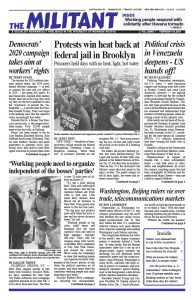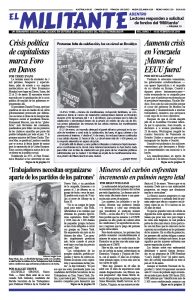Violating Venezuelan sovereignty, the U.S. rulers — with bipartisan support and backing from their allies in Europe, Canada and some Latin American countries — are making progress in pressing for the collapse of the government headed by Venezuelan President Nicolás Maduro. This has only been possible because of the course of the Maduro government that has alienated and demoralized large numbers of working people, while enriching a layer of the capitalist class.
After newly elected head of the opposition-led National Assembly Juan Guaidó declared himself president Jan. 23, Washington froze Venezuelan bank accounts in the U.S., including for the state-owned oil company PDVSA. U.S. officials announced they were turning the funds over to Guaidó.
Guaidó is calling on the Venezuelan military to overthrow Maduro, promising them amnesty if they do so.
Demonstrations in support of Guaidó Feb. 2 were substantially larger — and took place in cities, towns and neighborhoods all across the country, including many that had been strongholds of Maduro and his predecessor Hugo Chávez — than one called to support Maduro.
Chávez, a former military officer, was elected president in 1998 in the midst of an upsurge by workers and peasants across the country. They fought for land for poor peasants, to build labor unions and for social programs to benefit the most oppressed. In the first years Chávez backed their struggles. And revolutionary Cuba bolstered the fight by sending thousands of internationalist volunteers to help extend literacy nationwide and provide health care.
Washington has especially hated the friendly relations between revolutionary Cuba and the people of Venezuela.
Chávez, and then Maduro, made it clear they had no intention of following the road opened by Cuban workers and farmers, who through their 1959 revolution formed a workers and farmers government, nationalized both foreign and Cuban capitalist-owned industry and banks, dismantled the old army and carried out a socialist transformation.
Instead, the Venezuelan government tried to regulate capitalism and the market. It took some profits from the state-owned oil company to fund social programs, subsidize food and build houses.
‘Managing’ capitalism no solution
Widespread corruption, lack of maintenance and mismanagement of the oil company led to breakdowns and falling production. Declining wages and deteriorating working conditions led to a growing exodus of workers and a 45 percent drop in production since 2014.
These developments were exacerbated by a drop of some 50 percent in oil prices over the same period. Oil accounted for 95 percent of the country’s hard currency. While the Maduro government has been able to keep some social programs going, conditions for working people have worsened. Inflation is at 1 million percent. Basic medicines are unattainable. Violent crime is rampant, among the highest in the world. Basic necessities are often available only on the black market.
The deterioration of health care, closing of factories and landlord-sponsored paramilitary attacks on peasants organizing for land, have all taken a toll. Millions have fled the country.
Maduro blames U.S. imperialism — and it has played a role — but the policy of the government to try to shore up capitalism is at the root of the crisis.
As more workers have joined the protests calling on Maduro to step down, he has sent special police units to attack his opponents in working-class neighborhoods.
Maduro offered to negotiate with Guaidó. But with growing international backing and the U.S. rulers squeezing the government, Guaidó brushed Maduro aside.
Taking advantage of the unpopularity of Maduro’s refusal to allow international “humanitarian” aid to reach Venezuela, Guaidó announced he was organizing the shipment of millions of dollars of basic necessities. He calls on the army to let the aid in.
Promoting slanders that Cuban advisers “run” the Venezuelan security forces, the Donald Trump administration announced plans to step up U.S. pressure on revolutionary Cuba.
Cuba has some 21,000 internationalist volunteers in Venezuela, providing medical care to those most in need. And Cuba demands the U.S. rulers back off their attacks on Venezuelan sovereignty and let the people there determine their own affairs.
The Trump administration has indicated it might not renew the suspension of “Title III” of the Helms-Burton law in March. U.S. citizens — both native-born capitalists and those who fled Cuba after the revolution — would then be able to file lawsuits against Cuba demanding payment for properties that were nationalized after 1959.

